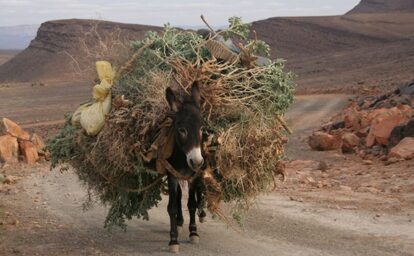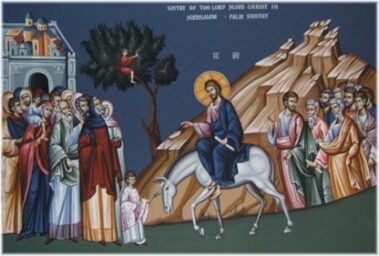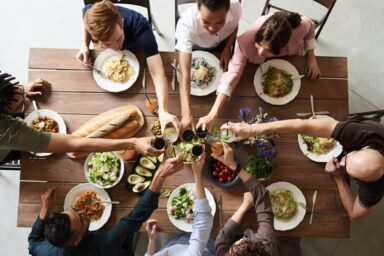Three sermons preached by Mother Katie during Holy Week: The Donkey, the Dinner and a Duty.
The Donkey
preached at Celtic Communion

Donkeys carry all sorts of things – they have no choice in what their load will be – it could be oil or grain, fruit or bricks, silk and cloth to sell or water and fuel for survival. A donkey might carry a bride on her way to the wedding or the Prince of Peace himself.
Today in our reading, just as a donkey brought Jesus to his place of birth, it is a donkey who begins that journey to the cross and Christ’s death and resurrection in Jerusalem.
Noble men and Kings and Captains would have ridden horses into battle in the time of Jesus – a horse was a status symbol – if you wanted to show power you rode a horse. But a donkey was a worker animal – a donkey carried everything from the most common and most heavy to the most precious and finest goods.
Donkeys turn out to be a surprisingly good choice for a ride too – they are stronger than horses and capable of carrying very heavy burdens. They are also far more steady than horses on their feet – able to make it over tricky ground – they are known to think deeply, spot dangers, exercise caution and donkeys usually only refuse to work or move for very good reason (so contrary to myth – a donkey is intelligent not stubborn). The donkey will work hard and puts its energy into obeying its master, patiently carrying the load and finding energy for the journey. A donkey makes a good member of the discipleship team!
The donkey also fulfils prophecy in this passage – in Zechariah 9:9 it predicts the Messiah will come as a King – humble and riding on a donkey. It also has echoes of other biblical events – when Abraham was asked to sacrifice Isaac his son and when Solomon rode to his coronation on a donkey that belonged to his father King David.
So all sorts of messages are being sent to us about the meaning of what is to happen through the image of this donkey. It is about sacrifice and obedience to the call of God – and it is about Jesus becoming King and the humble victory of God.
In modern Hebrew the phrase “the Messiah’s Donkey” is used to refer to someone who does the dirty work on behalf on another.
The donkey is therefore part of the prophetic drama of this last week in Christ’s life. And he is worth pondering on. I wonder what loads you are carrying this Holy Week? And what we might learn about from the donkey about how to carry them? Maybe we could all be ‘more donkey’ this week as we seek to carry Christ into our world?

The Dinner
preached on Maundy Thursday

Lockdown has taken away many things for all of us – but perhaps the one I have personally missed most is sharing a meal with friends. Eating with those we love is about more than food. A meal with a good friend has the power to transform and connect us to each other and our best selves. In these moments we can laugh, we can share intimate thoughts, we can empathise and encourage. It sustains us.
And it has been a great loss to have lost that sacred space.
Of course, in church we too have missed sacred space too – and sharing our meal together – the Eucharist – and that has been equally hard for many of us. I almost cried as I distributed the bread on Palm Sunday for the first time since before Christmas. We need to eat together.
And this has been lacking for too long – physically and spiritually – we’ve had to endure a desert time where the food we need is scarce. In many ways a proper Lent – and so to be able to come to the table again on this night – the night that the ritual of communion was first started is incredibly moving to me this year especially.
Meals have always been important in the Bible. Evil, we are told, came through the meal of just one apple. Which I’ve always secretly taken as an argument in favour of carbs – bread appears to be the winner in the bible and fruit a bit dodgy to be honest.
But seriously – that apple meal of rebellion in the garden of Eden is replaced with bread and wine at the last supper – a meal symbolic of obedience and sacrifice and generosity – of the new creation and new garden that will begin on Golgotha.
Meals in both the old and new testament testify to the presence of God and the provision of God. A meal is often used as the description of the Kingdom in the gospels and as an image of our final salvation in Revelation. Christ’s followers were known for eating and drinking – leading to Jesus being accused of being a drunk and a glutton – it was shocking behaviour at the time. Quite unlike the fasting and praying that was expected and seen for example in the followers of John the Baptist. Food was always central though: when the prodigal returns – it is to a feast; when the crowds are hungry it is a feeding miracle that satisfies and inspires – creating meals for over 5,000 with a small basket of food; when Christ speaks of his final return it is a banquet all are invited to. When Jesus rises from the dead two of his most important encounters will be over a meal – one at Emmaus and one on the beach where Jesus will cook the disciples fish for breakfast.
I’ve always loved that as a resurrection image. The hero returns and cooks breakfast on the beach. So humble, so ordinary – even having broken the gates of hell. I watch action movies today and again it is not what we expect – the hero returns to applause and not service in Hollywood. But with Jesus it back to those donkey ways I spoke of on Wednesday.
Food encourages us to acknowledge community – to never seek glory just for ourselves. We eat together – of food provided and prepared by many. Few of us cook all our own food – much less grow all the food we need – we buy food grown and harvested by others – we receive food in restaurants and friends’ homes – we are dependent on each other for the food we eat. We are also ultimately dependent on the Creator – our Father God – for our daily bread and apples!
And this should lead to attitude of grace and gratitude – a willingness to realise we are subjects of the King – people under authority – hence why it has been Christian tradition for centuries to pray before a meal.
No one in the ancient world ever took food for granted. It was a precious gift.
The homeless, the poor and disadvantaged in our own world do not take it for granted either. Each meal, like manna in the wilderness, is a treasured when your resources are limited – and we are reminded, often uncomfortably, of our dependence on others and God.
If we have enough food and we see others hungry this should make us slightly uncomfortable too. We are family under God – and his desire is that no one goes hungry – no one is left out. So as part of our commitment to sharing food – we are holding a collection at this service and on Easter Day for the Bishop of Southwark’s Lent Appeal – supporting the work of Food Banks in our Diocese. I urge you to give generously if you can so that through our giving we might share a meal with those who need it most just as Jesus would. You can give online too – or send a cheque to the office saying this is for the Food Bank Appeal.
The danger of wealth and having more than enough is that we can forget our need – and our dependence on God and others – mistakenly think we provide all we consume. We become entitled – and this leads to less of life not more.
I see this even in my own kitchen. We can suffer from an abundance of choice – which blinds us to what we have – my teenagers can often be heard shouting from the kitchen “Mum there is nothing in!” There is, there always is. What they mean is the Pringles have run out or there are no chocolate digestives left.
They do not know the pain of nothing in. And sometimes – indeed often – that is a real blessing and I thank God for it. But sometimes I wonder…if their privilege blinds them? And if they don’t need for themselves it is much easier to become deaf to the needs of others.
We learn things in vulnerability and lack and need that could never be taught in abundance. This isn’t just true for food – but for all good things. Now I’m not wishing for my children to go hungry – but I am wishing that they see the bread and cheese in the fridge as a blessing – and not as nothing in. And for that sometimes they might need to practice having less rather always striving after more.
I’ve prayed in this past year that we as a Church will learn to be grateful for what we have. Our usual meal and services taken from us – that we don’t stand and complain that there is “nothing in” – but that we see what is there with new and grateful eyes – looking to share our little with others who have even less.
And so on Maundy Thursday it is good to be reminded and brought back to the table of Christ – bread and wine for nourishing our bodies – and satisfying our hunger not just for food but more importantly for connection to God and others. To be reminded what meals are really about – to fill us with all we need – so that we might also help fill others.
Give us this day our daily bread, and the occasional apple too. Amen.
A Duty
preached on Easter morning

Jesus died on a Friday, which matters because it is the day that Sabbath rest begins. Sabbath was honoured above all else so the body of Jesus was taken to the tomb before being prepared for burial because all work needed to stop. Now this isn’t how any of them would have wanted it – they would have wanted to embrace his body and wash it and prepare it for burial. And instead because the sun sets all activity must stop – that is the custom and law.
But Sabbath, even though it was its own kind of lockdown, was always meant to be a gift. Even when rest seemed inconvenient and not well timed – even when, perhaps especially when, there were still things to be done. The very act of being still silenced the static of stress so that the whisper of God’s peace could be heard again.
Sabbath was always intended as a gift from a loving parent – God’s way of making sure we call home and check in. That at least once a week we get to hear our Father’s voice tell us how much he loves us. So that we can be freed from worry and ambition and self-importance and loneliness, hurry and envy – and just enjoy God – and trust him for all we need.
When the people waited on God, rested in his presence, trusted in his providence to do all that needed to be done – even as they did nothing – something was able to emerge that can only happen when we cease from all striving. We make room for God to act – and show us his glory.
And in this way the sabbath humbles those who observe it. Bringing our egos down to size. Our need to do and impress, and to be seen and to get praise is put in its place. It reminds us that the only mirror worth viewing ourselves in is that of divine life and calling – the view from eternity.
And so Sabbath is the perfect thing to have between the cross and resurrection. Time for God alone to act. Time for us to be still and rest, trusting our Father will provide all we need.
Sabbath humbles us. And it is humble women – knowing their own weakness – aware of their own limits who come to grave that morning. The women took their spices and oils and went to the tomb – as was their custom and their duty – .
And the women, having waited on God, don’t come looking for miracles but in peace simply to do their duty – to show their love for the one who loved them so well.
And perhaps because the Sabbath gave them strength they are not deterred by the wait through the night or the potential difficulties of the day. They go – immediately – just as the disciples first followed from the shores and left their nets.
There is a moment that reveals that they realise their limits and they worry about who will move the stone – sabbath has reminded them of our dependence on God and each other – and they know that in their duty they will need help – they can not do it alone. None of us can. Duty is always a community effort and not a solo venture – perhaps Covid has reminded us of this truth in the past year – we act most powerfully when we act together.
And in their going and the doing – in the ritual of duty – they experience resurrection. The most extraordinary new beginning of all time.
To me the story of the women is what Easter today is all about. Staying by the cross – then taking time to rest. Letting rest humble us. Leaving our unfinished business in the hands of the one who says “It is finished” for us all. Taking time to enjoy God and listen for his voice whisper you are forgiven – you are loved – just as you are. Doing our duty – and letting the performing of holy rituals, as in this service, give us a glimpse of resurrection – in the bread and wine – in the word and in music – in prayer and in silence.
And if we can still ourselves enough to make our Sunday service a sabbath moment – perhaps we too in might experience the truth – that – He is risen! And he is risen for you.
A joy so deep – that we too must go out and tell.
So this Easter take time to rest in God – and be in awe of all he provides – and trust him for all he needs. He loves you.
Amen.